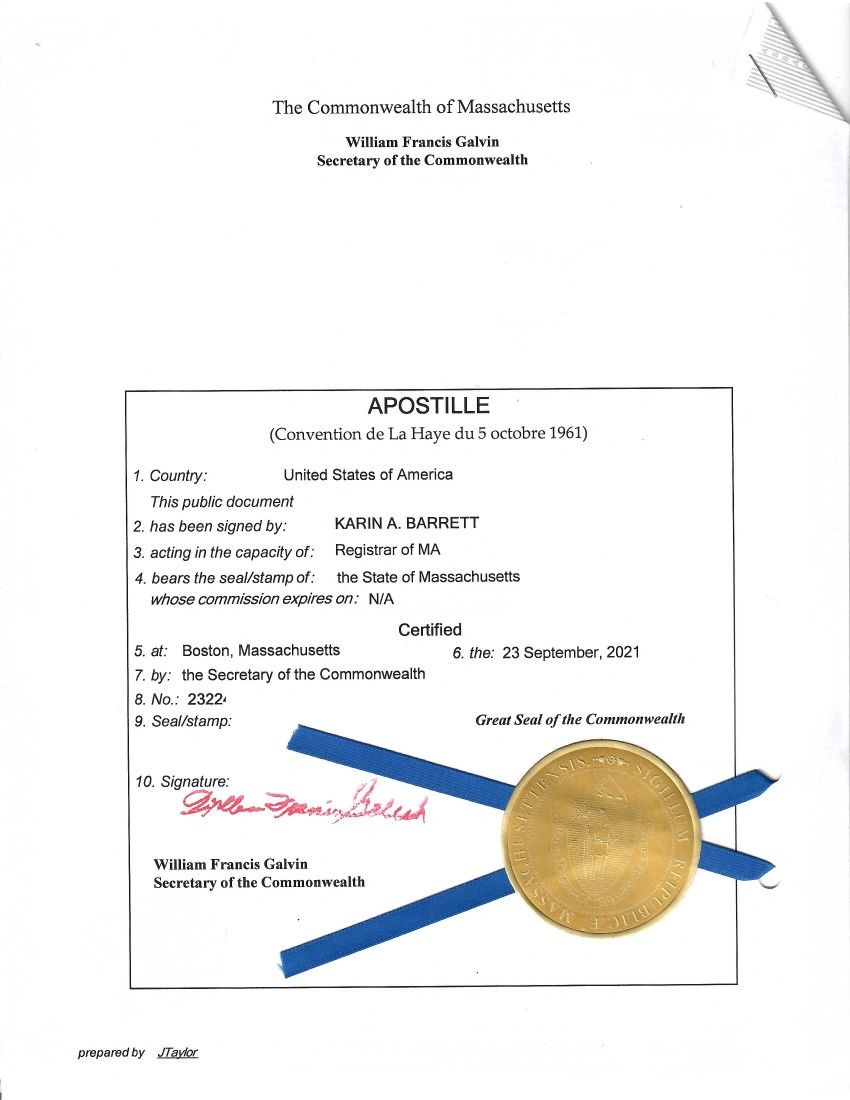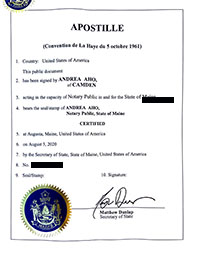Recognizing the Apostille Refine: A Comprehensive Guide to International Paper Verification
Navigating the complex landscape of international file verification can be discouraging without a clear understanding of the apostille process. This overview thoroughly outlines the required steps, from determining which records require accreditation to submitting them for confirmation by the Competent Authority. Realizing the importance of an apostille and recognizing prospective risks, such as insufficient entries and language obstacles, can significantly streamline the authentication journey. What precisely defines an apostille, and why is it so important for papers predestined for Hague Convention nations? These concerns develop the structure of our expedition right into this necessary lawful treatment.
What Is an Apostille?
An apostille is an official certification that confirms the credibility of a file for usage in another country. This qualification, released by a designated authority in the nation where the file originated, ensures that the document is identified as valid and legitimate in the global sector. The process of obtaining an apostille entails numerous steps, including the confirmation of the paper's signatures, seals, and stamps by appropriate governmental bodies.
The apostille works as a globally recognized kind of verification, made possible by the Hague Convention of 1961. This treaty, formally called the Hague Convention Abolishing the Need of Legalisation for Foreign Public Papers, standardizes the procedure of file qualification amongst member nations. The apostille itself is a standardized certification which contains specific info, such as the issuing authority, the nation of origin, and the day of issuance.
It is necessary to keep in mind that not all documents are qualified for an apostille. Usually, public documents like birth certifications, marriage licenses, court orders, and academic diplomas get approved for this accreditation. Exclusive files, such as agreements and agreements, might require registration and added steps to certify.
Importance of Apostille
Comprehending what an apostille is establishes the stage for valuing its significance in worldwide ventures. houston tx apostille. An apostille, essentially a type of qualification issued by an assigned authority, confirms the authenticity of a paper for usage in foreign countries that are notaries to the Hague Apostille Convention. This standard procedure eliminates the requirement for more legalization by embassies or consulates, therefore improving global purchases
The significance of an apostille can not be overemphasized. It makes certain the trustworthiness and acceptance of vital records-- such as birth certifications, marriage licenses, and educational diplomas-- across borders. For services, it promotes the smooth conduct of international trade, mergers, and acquisitions by offering a trusted technique of paper confirmation. This minimizes governmental difficulties, conserving both time and sources.
Furthermore, an apostille enhances lawful safety and security and conformity. Federal governments and institutions can with confidence depend on the credibility of see this here papers birthing an apostille, alleviating the risk of fraudulence and misrepresentation.
Papers That Call For Apostille
When engaging in global transactions or legal issues, specific files usually require the authentication provided by an apostille. This guarantees their recognition and acceptance in countries that are signatures to the Hague Apostille Convention. Typically, individual files such as birth certifications, marital relationship certificates, and death certifications call for an apostille, especially when they are utilized for procedures like migration, marital relationship abroad, or international probate matters.
Educational papers are an additional group frequently requiring apostilles. Diplomas, transcripts, and academic documents usually need this authentication for functions such as going after additional education and learning, work, or specialist licensing in an international nation (houston tx apostille). This action assures that the documents are recognized as genuine and valid
Legal files, including powers of attorney, sworn statements, and court orders, likewise frequently require apostilles. Service papers such as certifications of consolidation, laws, and industrial contracts may require an apostille to facilitate international profession, develop international branches, or take part in cross-border lawful procedures.
Actions to Obtain an Apostille

Obtaining an apostille involves a multi-step process that ensures the credibility and approval of your records in international nations. The preliminary step is identifying which documents require an apostille. houston tx apostille. Usual papers include copyright, marital relationship licenses, scholastic records, and business documents
Once recognized, the paper should be certified by the appropriate releasing authority. This may involve registration by a notary public or confirmation by a regional or state authorities, depending on the type of record. After qualification, the file should be submitted to the assigned Competent Authority in the file's nation of beginning. In the United States, for instance, this is normally the Secretary of State's workplace for every state.
The entry process normally requires a finished application form, the original record, and a charge. Some territories may supply the option of expedited handling for an extra cost. Upon successful confirmation, the Competent Authority will attach the apostille certification to the file, website link therefore confirming its credibility.
Usual Challenges and Solutions
Navigating the apostille process can provide a number of typical obstacles that, if not effectively addressed, may delay or complicate file authentication. Each country has particular demands for the kinds of papers that can be apostilled, and any type of inconsistency from these can result in denial.
An additional usual obstacle is recognizing the diverse handling times. Handling times can vary substantially in between nations and even in between various regions within the exact same country. It is necessary to make up these variants when preparing the apostille process to avoid unexpected delays.
In addition, language obstacles can posture considerable challenges. Files in a foreign language frequently require qualified translations, and any kind of mistakes in translation can result in further complications. Involving an expert translation service can mitigate this threat.

Conclusion
Mastering the apostille procedure substantially improves the efficiency of international record verification. By comprehending the necessity of recognizing and accrediting required records, and browsing the submission to the Competent Authority, the procedure helpful site ends up being more convenient. Understanding of common obstacles, such as incomplete entries and language barriers, better help in avoiding possible delays. Ensuring papers are correctly apostilled promotes their acceptance in Hague Convention signatory nations, thus sustaining seamless global legal and management procedures.